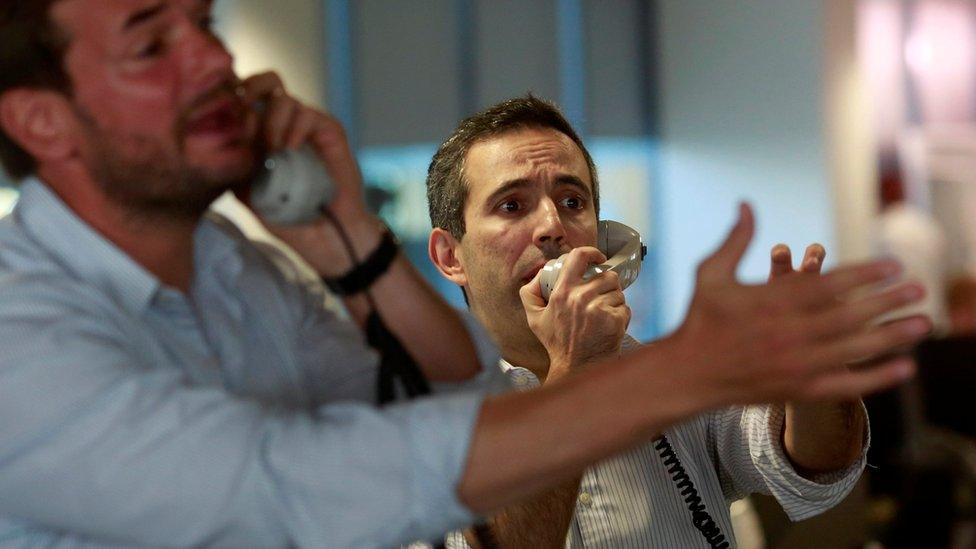EU referendum: Europe's press gripped by Brexit drama
- Published
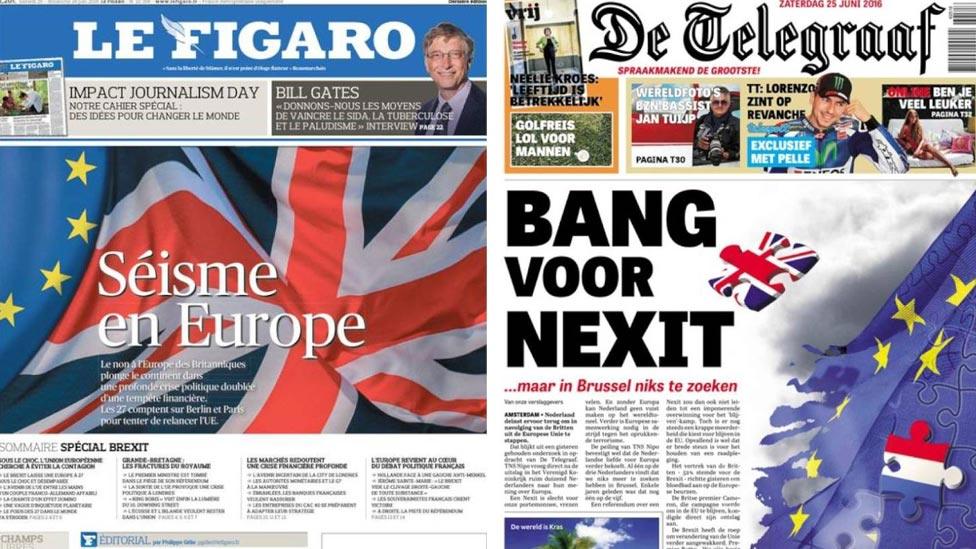
France's Le Figaro sees an "earthquake in Europe", and De Telegraaf reports "Fear of a Dutch exit"
European newspapers see the UK Brexit vote as a serious blow to European unity and a warning that EU politicians must address widespread economic pain.
There is a general view that Europe is struggling with a dramatic turning point in its history.
'Everything has changed'
The front page of France's Le Figaro , externalsays "everything has changed" because of the UK vote. Its editorial makes a criticism - echoed widely in the European press - that the EU has become too remote from voters.
This is "the end of Europe as we knew it", writes Philippe Gelie, and the EU must "review everything - methods, objectives, and participants", in order to save itself.
Le Monde's, external editorial sees the vote as the response of those "abused by globalisation... which in Europe is represented by the European Union".
It warns European leaders that if they do not address the decline in wages and public services that many Europeans associate with migration, populists will continue to tempt voters with their "miracle cures - or worse".
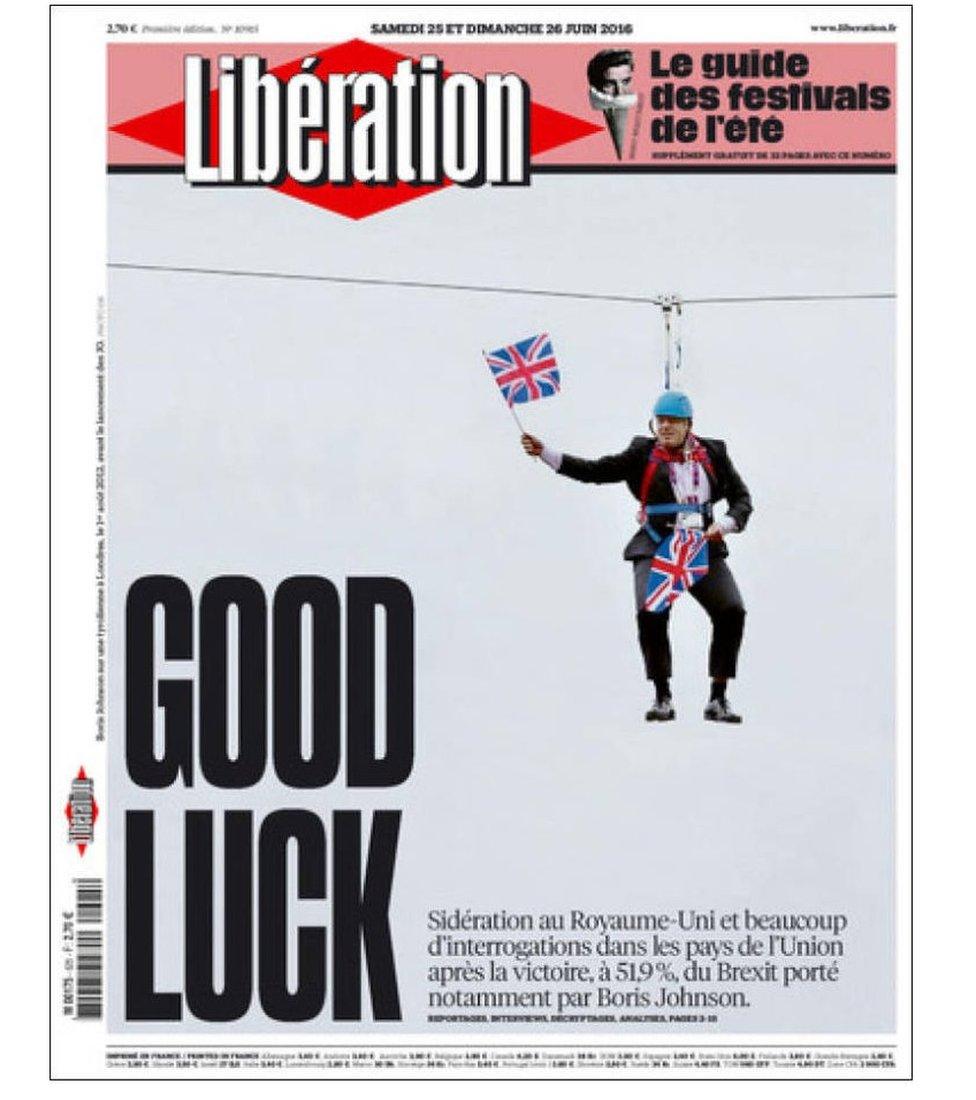
France's Liberation wishes Britain all the best
Liberation's, external editorial also puts the blame for Brexit firmly on the EU, which it says ignored public discontent, with its "tortuous path towards a bright utopia", and "finished the job with its soft response to the social crisis and irresolution over the migration crisis".
The result is that, not only in Britain, "ordinary people are turning towards their nations as the only credible bulwark against the excesses of globalisation".
Liberation's solution is for the European Commission to cede power to the European Parliament, which can then make the voice of the people heard and "ward off the democratic crisis".
'Well done, Little Britain'
German papers also focus on the impetus Brexit has given to other Eurosceptic parties on the continent, and Die Welt, external says Chancellor Angela Merkel may also come under pressure. It says she has contributed to "the EU's political failure through her unilateral actions on refugee policy".
Looking at the UK, it predicts a gloomy future in which UKIP will mutate into a "mild form of fascism" to exploit economic discontent, leaving the country "like France today: full of resentment, incapable of reform, and divided".
Tageszeitung's, external front page has the ironic headline - in English - "Well done, Little Britain". The Brexit vote has "rocked the continent, left populists everywhere jubilant, and really angered young Europeans", it says.

But the paper also warns that the vote was a revolt "against those on high", and that populist parties in Europe will now use the referendum threat to put pressure on their own governments.
"The European Union is now at a turning point, and if the German government thinks it can continue just like before, it could bring this Europe crashing down around their ears," it concludes.
'End of globalisation'
In Italy, Corriere della Sera, external's Antonio Polito says the EU must show "humility" in addressing public concern about its policies.
La Repubblica's, external financial analysts say the wave of Euroscepticism means the "end of globalisation" and the grim possibility of a fall in Italy's growth rate this year.
The paper also devotes considerable space to the idea of an independent London. Enrico Franceschini, external likes the idea, declaring "Enjoy your Little England. But leave London out of it. Shall we begin collecting signatures to found the London Free State?"
Spain's El Mundo, external focuses on the harm it sees Brexit doing to the European economy, but is sure that EU-UK relations will remain strong.
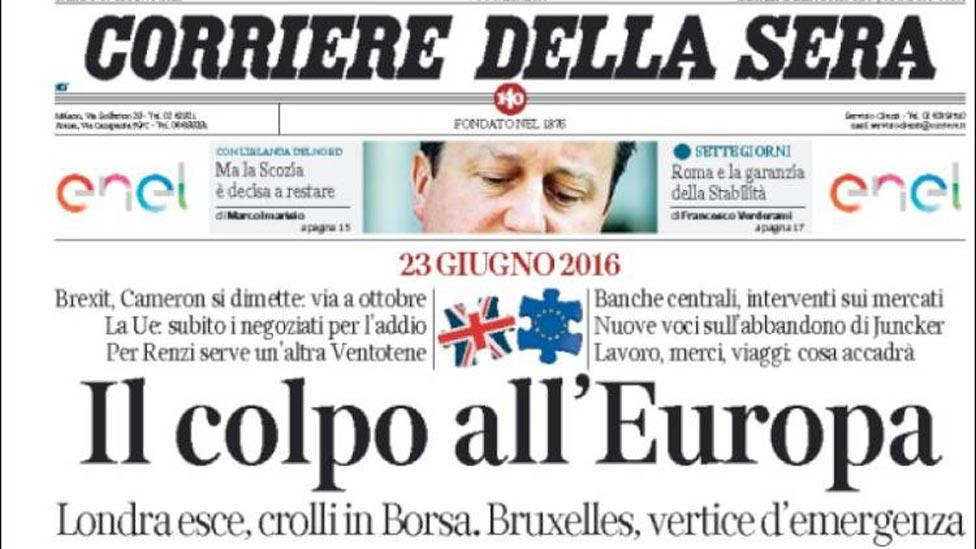
Italy's Corriere della Sera reports a "blow to Europe"
In the Dutch NRC Next, external tabloid former European Commission official Luuk van Middelaar calls on European leaders to "hold the line" against populist Eurosceptics, by showing that Brexit is "an amputation, not a death blow".
The leaders must address "disillusionment with the EU among their own voters", by strengthening EU border controls and reinforcing the eurozone, he says.
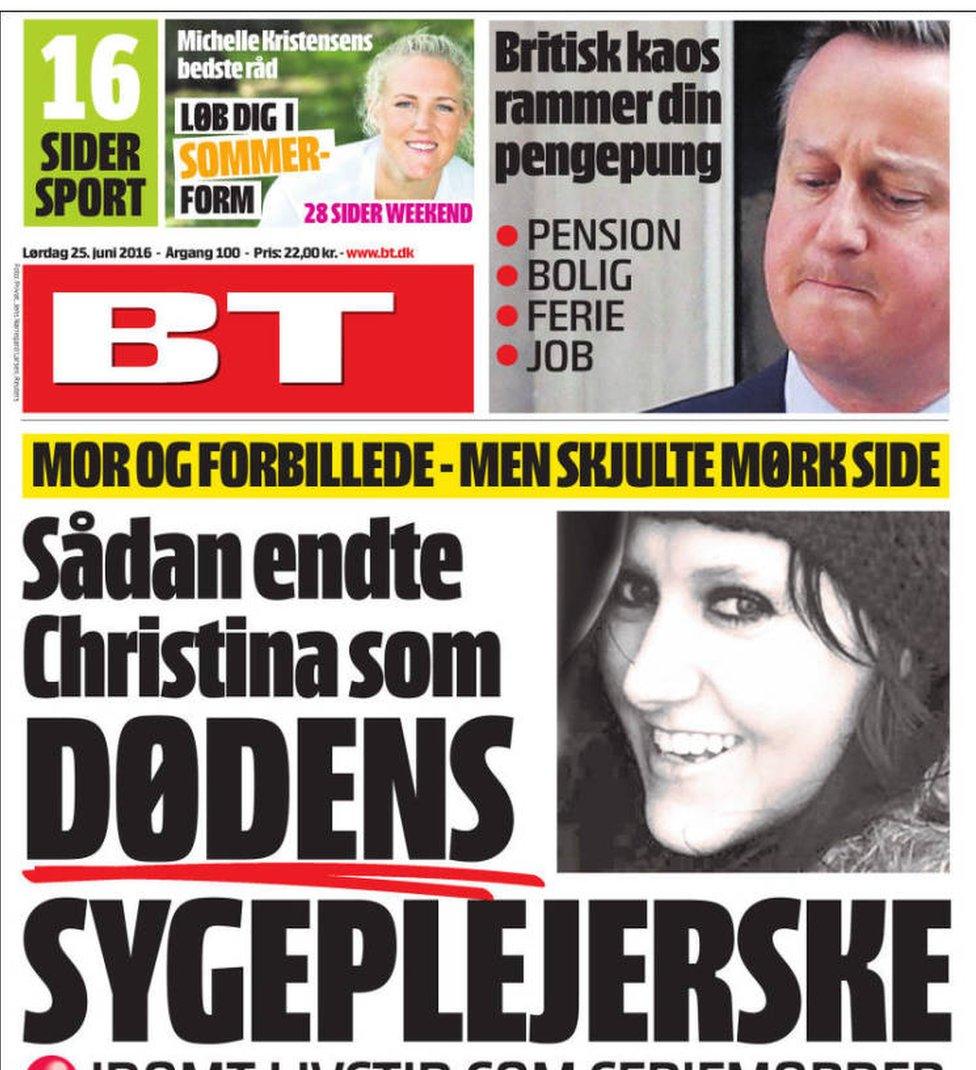
Denmark's BT says "British chaos hits your wallet"
De Telegraaf's, external front page suggests that the EU fears the Netherlands will be next to seek an exit referendum.
A poll it carried out shows most voters fearing exit would be "bad for our wallets" and reduce the country's role on the world stage, but their lead over "Nexit" supporters is narrow.
The editorial in Sweden's Dagens Nyheter, external sees a "dark day for Europe" and in particular for Sweden, which it considers to be one of the "big losers" by Brexit because the UK was its "important ally on free trade, being a non-euro economy".
It calls for a "strong and well-coordinated EU" to meet the challenges of migration and Russia's new assertiveness. Like most other papers, it says Europe must address the concerns of a sceptical public who "vote as citizens of their own countries, not as Europeans".
A leading Polish daily, Rzeczpospolita,, external has published an interview with former Polish president, Aleksander Kwasniewski, who is unforgiving.
He says British anti-migrant sentiment is "terrible hypocrisy". "They need migrants like they need air, then use them to present a negative narrative," he complains.
As for the impact of Brexit on Europe, he is more restrained. "It's not yet the greatest misfortune, but still quite a big headache."

And beyond the EU...
The UK vote is still a top story in Russia, with official TV channels, external making much of the protests in London and Scotland, calls for a referendum in Denmark, and Spain "trying to break off a chunk of Britain" in the form of Gibraltar.
Analyst Alexei Mukhin tells the Moskovsky Komsomolets newspaper, external that "Brexit is playing out in Russia's interests" because "Britain was the EU member most hostile to Russia, and its departure will make the EU more friendly".
Columnist Yulia Latynina writes in the independent daily Novaya Gazeta , externalthat British voters "rose up" against the EU because it is a "massive socialist state, devouring the ruins of European civilisation".
Some commentators wonder whether the UK will use its new status to forge stronger links with Asia.
The Times of India , externalsays India may be hit by post-Brexit market uncertainty, and Indian companies will have to reconsider using Britain as "the springboard to Europe". The paper sees protectionist tendencies as a threat to emerging economies like India.
Tokyo's Asahi Shimbun fears, external that Britain may seek closer ties with China and thereby "endanger Japan's national security, in light of moves by Beijing to strengthen its maritime presence in the region".
Rwanda's official New Times, external flags up the possibility of the UK breaking up, and urges African countries to draw the lesson that "there is strength in unity, and staying together is healthier than being a lone wolf".
BBC Monitoring, external reports and analyses news from TV, radio, web and print media around the world. You can follow BBC Monitoring on Twitter , externaland Facebook, external.
- Published25 June 2016
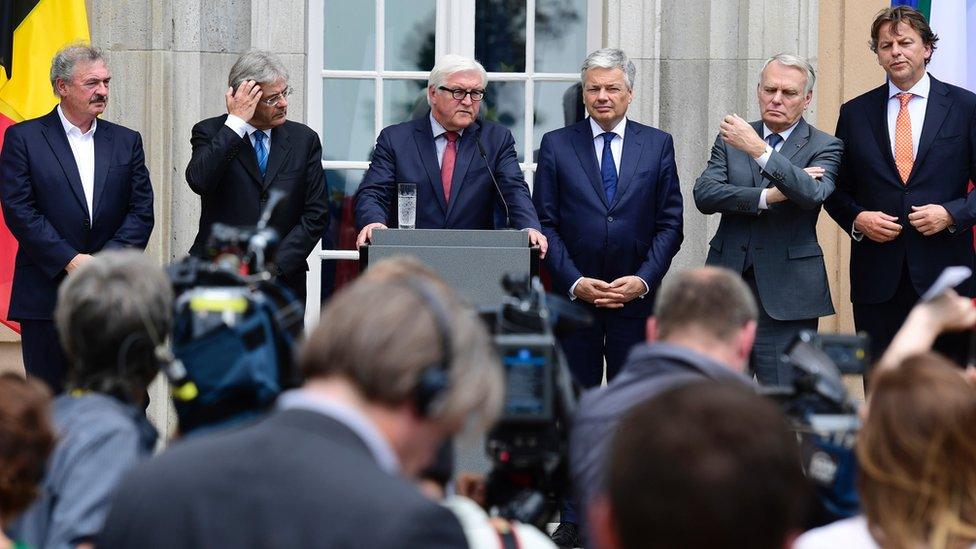
- Published24 June 2016
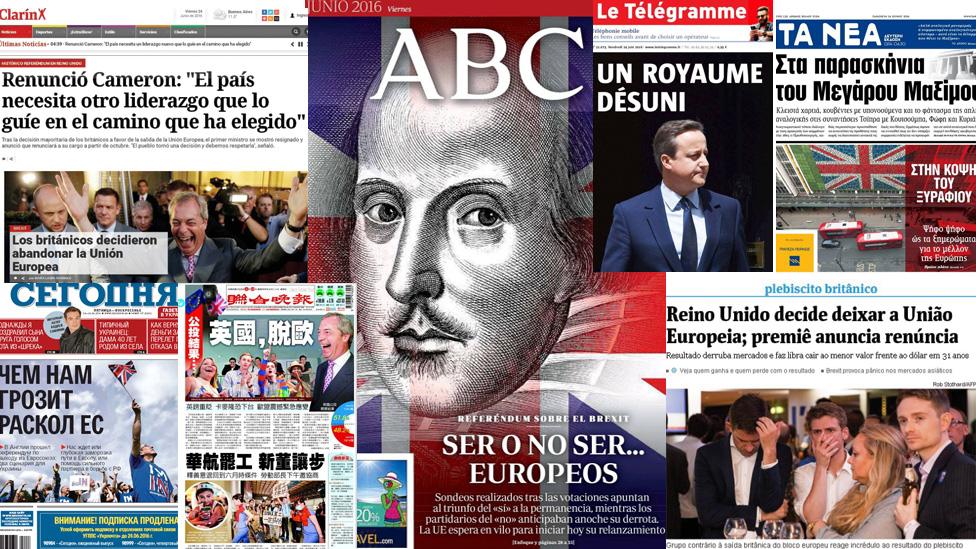
- Published25 June 2016
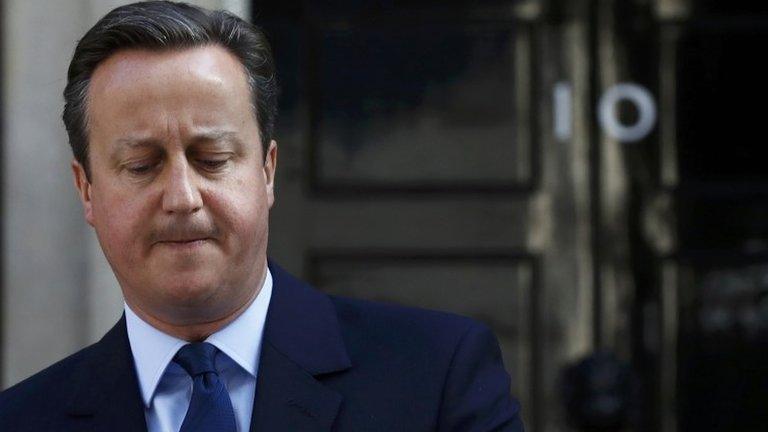
- Published24 June 2016
